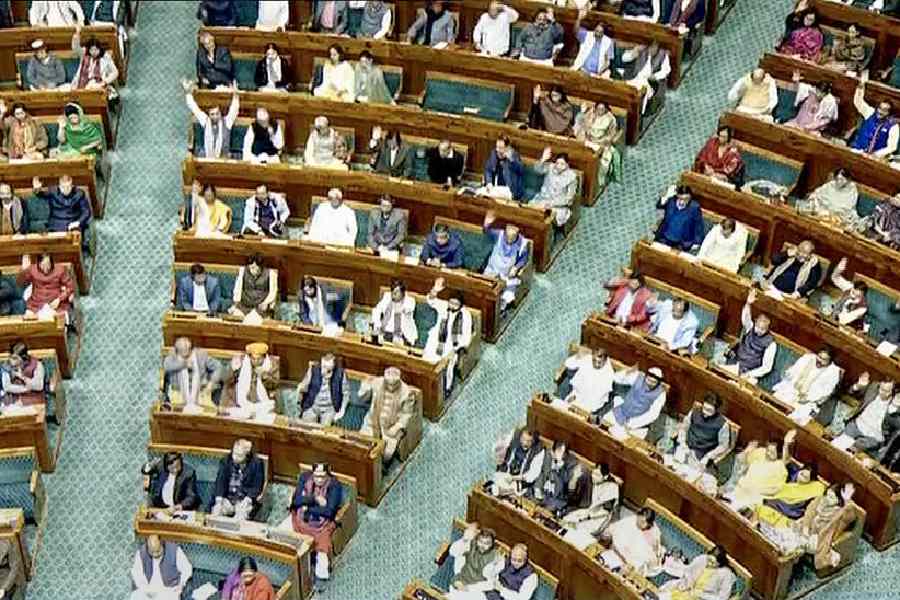The Centre on Monday introduced a bill in the Lok Sabha to check malpractices in government recruitment exams such as paper leaks and fake websites, with strict penalties including a minimum jail term of three years and a fine up to Rs 1 crore.
At present, there is no specific substantive law to deal with unfair means adopted or offences committed by various entities involved in the conduct of public examinations by the central government and its agencies.
The Public Examinations (Prevention of Unfair Means) Bill, 2024, introduced by Union Minister of State for Personnel Jitendra Singh, mentions "leakage of question paper or answer key", "directly or indirectly assisting the candidate in any manner unauthorisedly in the public examination" and "tampering with the computer network or a computer resource or a computer system" as offences done by a person, group of persons or institutions.
The bill will cover entrance examinations held by the Union Public Service Commission (UPSC), the Staff Selection Commission (SSC), the railways, banking recruitment examinations and all computer-based examinations conducted by the National Testing Agency (NTA), Singh said.
It proposes a minimum of three to five years of imprisonment to curb cheating and those involved in organised crimes of cheating will face five to 10 years of imprisonment and a minimum fine of Rs 1 crore, he said.
The bill is aimed at preventing organised gangs and institutions that are involved in unfair means for monetary gains, but it protects candidates from its provisions, the minister said.
"In the last few years, leaks of question papers and organised cheating had affected the interests of lakhs of students due to cancellation of tests and examinations," Singh was quoted as having said in a statement issued by the personnel ministry.
He said many states have had to cancel or were unable to declare results of their public examinations in the recent past due to adverse impact of unfair practices and means adopted by anti-social, criminal elements.
"These unfair practices, if not effectively prevented and deterred, will continue to jeopardise the future and careers of millions of aspiring youths of this country. In many instances, it has been observed that organised groups and mafia elements are involved. They deploy solver gangs, impersonation methods and indulge in paper leaks. The bill primarily aims to deter such kind of nefarious elements,” Singh said.
He said, the objective is to bring in a greater transparency, fairness and credibility to the public examination systems and to reassure the youth that their sincere and genuine efforts will be fairly rewarded and their futures are safe.
“The bill is aimed at effectively and legally deterring persons, organised groups or institutions that indulge in various unfair means and adversely impact the public examination systems for monetary or wrongful gains,” Singh added.
In view of many examinations being conducted online and the increasing role of technology in conduct of public examinations, he said, it has also been decided to set up a high-level national technical committee also.
The committee shall look into developing protocol for insulating digital platforms, devising ways and means for developing foolproof information technology (IT) security system, ensuring comprehensive electronic surveillance of the examination centres and formulating national standards and service levels for both, IT and physical infrastructure, to be deployed for conduct of such tests, the minister said.
The bill makes "creation of fake website to cheat or for monetary gain", "conduct of fake examination, issuance of fake admit cards or offer letters to cheat or for monetary gain" and "manipulation in seating arrangements, allocation of dates and shifts for the candidates to facilitate adopting unfair means in examinations" as punishable offences.
The bill makes "threatening the life, liberty or wrongfully restraining persons associated with the public examination authority or the service provider or any authorised agency of the government; or obstructing the conduct of a public examination" a punishable offence.
The bill shall serve as a model draft for states to adopt at their discretion.
"This would aid states in preventing the criminal elements from disrupting conduct of their state-level public examinations," the objects and reasons of the proposed law states.
The bill covers recruitment examinations conducted by the UPSC, SSC, Railway Recruitment Boards (RRBs), Institute of Banking Personnel Selection (IBPS) and the NTA among others.
Ministries or departments of the central government and their attached and subordinate offices for recruitment of staff and any "authority as may be notified by the central government" for conduct of government job recruitment are also under the ambit of the proposed legislation.
The bill's provisions extend to entrance examinations like the National Eligibility Entrance Test (NEET), Joint Entrance Examination (JEE) and the Common University Entrance Test (CUET).
Except for the headline, this story has not been edited by The Telegraph Online staff and has been published from a syndicated feed.











